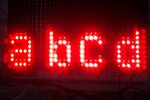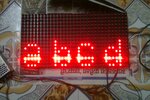pravin b
Member level 5
- Joined
- May 20, 2012
- Messages
- 85
- Helped
- 2
- Reputation
- 4
- Reaction score
- 1
- Trophy points
- 1,288
- Location
- Mumbai, India
- Activity points
- 2,083
Hello Friends,
I am trying to interface the p10 led matrix display module with pic16f1939 running at 32MHz internal clock, MPLABx & HI TECH C Compiler.
To send the data to display I am using software spi routine (attached below). and regarding the protocol details I am referring DMD Notes.txt found here
. Since "i think" i am doing same as specified in the txt file, however I dont see anything on my display, its just blank. It would be nice if someone can help me. I have written a code to display "abcd" on the display through 16*4 array.
my main code
my spi routine
pin assignment
Thanks!
I am trying to interface the p10 led matrix display module with pic16f1939 running at 32MHz internal clock, MPLABx & HI TECH C Compiler.
To send the data to display I am using software spi routine (attached below). and regarding the protocol details I am referring DMD Notes.txt found here
HTML:
http://forum.freetronics.com/viewtopic.php?t=5754my main code
Code:
#include <htc.h>
#include "include.h"
// PIC16F1939 Configuration Bit Settings
__CONFIG(FOSC_INTOSC & WDTE_OFF & PWRTE_ON & MCLRE_ON & CP_OFF & CPD_OFF & BOREN_OFF & CLKOUTEN_OFF & IESO_OFF & FCMEN_OFF);
__CONFIG(WRT_OFF & VCAPEN_OFF & PLLEN_ON & STVREN_ON & BORV_LO & LVP_OFF);
// a b c d
unsigned char dmdbuff[16][4]={//C0 C1 C2 C3
{0x00,0x00,0x00,0x00}, //R0
{0x00,0x00,0x00,0x00}, //R1
{0x00,0x00,0x00,0x00}, //R2
{0x00,0x00,0x00,0x00}, //R3
{0x00,0x00,0x00,0x00}, //R4
{0x00,0x00,0x00,0x00}, //R5
{0x00,0x00,0x00,0x00}, //R6
{0x00,0x00,0x00,0x00}, //R7
{0x00,0x20,0x00,0x04}, //R8
{0x38,0x20,0x38,0x04}, //R9
{0x44,0x2c,0x44,0x34}, //R10
{0x04,0x32,0x40,0x4c}, //R11
{0x3c,0x22,0x40,0x44}, //R12
{0x44,0x32,0x40,0x44}, //R13
{0x44,0x32,0x44,0x4c}, //R14
{0x38,0x2c,0x38,0x34}, //R15
};
char row,x,y;
void main()
{
system_init();
while(1)
{
show_row(0);
show_row(1);
show_row(2);
show_row(3);
}
}
void system_init()
{
OSCCON = 0b01110000; // 32 MHz Fosc w/ PLLEN_ON (config bit)
TRISC=0b00000000;
// PORTC=0;
TRISD0=0;
pin=0;
// USART_Init();
// ms1_delay(100);
// USART_putstring("UART_OK\r");
swspi_init();
}
void show_row(char temp)
{
for(y=0;y<=3;y++)
{
swspi_write_byte(dmdbuff[(16-4)+temp][y]);
swspi_write_byte(dmdbuff[(16-8)+temp][y]);
swspi_write_byte(dmdbuff[(16-12)+temp][y]);
swspi_write_byte(dmdbuff[(16-16)+temp][y]);
}
P10_LATCH=1;
us500_delay(1);
P10_LATCH=0;
scan_row(temp);
DISP_EN=0;
}
void scan_row(char temp)
{
switch(temp)
{
case 0: P10_A=0;
P10_B=0;
break;
case 1: P10_A=1;
P10_B=0;
break;
case 2: P10_A=0;
P10_B=1;
break;
case 3: P10_A=1;
P10_B=1;
break;
default:P10_A=0;
P10_B=0;
break;
}
}
void ms1_delay(unsigned int c)
{
unsigned int i,j;
for(i=1;i<=c;i++)
for(j=0;j<=568;j++);
}
void us500_delay(unsigned int c)
{
unsigned int i,j;
for(i=1;i<=c;i++)
for(j=0;j<=284;j++);
}
void interrupt my_ISR()
{
if(RCIF)
{
USARTdataready=1;
rx_byte=RCREG;
if(FERR || OERR)
CREN=0;
USART_putchar(rx_byte);
RCIF=0;
get_data();
}
}my spi routine
Code:
void swspi_init( void )
{
P10_A=0;
P10_B=0;
P10_PWM=0;
P10_SCK=0;
DISP_EN=1;
P10_DATA=0;
P10_LATCH=0;
}
/*************************************
write value to register
**************************************/
void swspi_write_byte(unsigned int temp)
{
unsigned char n=8;
// DISP_EN = 0;
// temp |= 0x80;
// P10_SCK = 0;
while(n--)
{
P10_SCK = 0;
if(temp&0x80)
P10_DATA=1;
else
P10_DATA=0;
P10_SCK = 1;
temp <<= 1;
}
NOP();
// DISP_EN = 1;
}pin assignment
Code:
#define P10_A RC0
#define P10_B RC1
#define P10_PWM RC2
#define P10_SCK RC3
#define DISP_EN RC4
#define P10_DATA RC5
#define P10_LATCH RC6Thanks!


